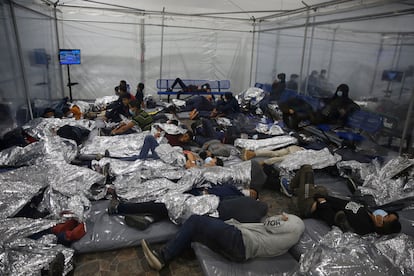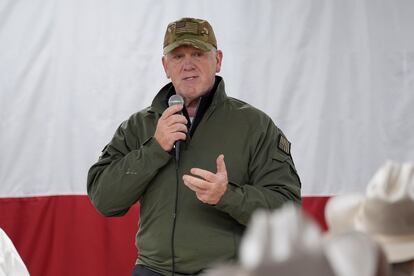This is how the family separation policy that shocked the world operated in the first Trump administration
Human Rights Watch argues that those responsible for the ‘Zero Tolerance’ policy applied at the border six years ago should not return to government. But the president-elect has already appointed three of them to new positions


“We need to discuss my proposal for separation,” Tom Homan wrote in an email in August 2017. The then head of the U.S. Immigration and Customs Enforcement Service (ICE) was referring to the policy of separating immigrant families, implemented at the border during Donald Trump’s first term in office. Although it did not go into effect until 2018, members of the Republican administration began to promote the measure just a few weeks after the tycoon took office in January 2017. Now, Homan and two other proponents of this policy will return to Trump’s second administration, a fact that has raised alarm bells among pro-immigrant organizations, as well as Human Rights Watch (HRW).
In a 135-page report released Monday, HRW warns against the return to power of immigration hawks like Homan because of the “serious, long-lasting trauma” they caused during Trump’s first term with the so-called Zero Tolerance policy that ended up separating more than 4,600 migrant children from their parents. Drawing on public and internal government documents, legal proceedings, and findings from internal investigations, the human rights organization traces the role played by, among others, Trump’s future “border czar” in implementing this policy, which many immigrant advocates fear could be repeated in his second term.
“[Homan] has been advocating that we need to separate family units,” one official wrote in another email in August 2017, reviewed by HRW. “If we announced that, how bad do you think it would get??” the official asked. A year later, it became clear how bad it would get: Thousands of children were torn from their families between May and June 2018 after the Trump administration implemented a policy at the border with Mexico under which any illegal immigrant was prosecuted as a criminal and thus separated from their children to deter other families from entering the country illegally.
With no record of the families being separated and no strategy for reuniting them, the children ended up crammed into prison-like detention centers without access to basic services such as showers, beds, or sufficient food. Although Trump ended up signing an executive order to supposedly put the policy on hold in June 2018, after it sparked domestic and global outrage, his administration continued to separate families until the Republican left office, albeit at a much slower rate. In total, between 2018 and 2021, more than 4,600 minors were separated from their parents after crossing the border illegally. To date, nearly 30% of them remain unaccounted for.
In addition to Homan, the report — prepared with the Texas Civil Rights Project and the Lowenstein International Human Rights Clinic at Yale University — points to two other people responsible for separating families at the border, and argues that these individuals should not return to power: Matthew Whitaker and Stephen Miller. According to the report, Whitaker — chief of staff to then-Attorney General Jeff Sessions between 2017 and 2018, and later acting Attorney General — showed his support for the family separation policy months before it was implemented, and participated in meetings to get it underway. A few weeks ago, Trump named Whitaker ambassador to the North Atlantic Treaty Organization (NATO).
Miller, then the White House’s top immigration adviser, pushed for forced family separations from early 2017, when the administration began to float the policy, the report said. A senior Department of Homeland Security official, quoted in the report, said: “Miller made clear to us that if you start to treat children badly enough, you’ll be able to convince other parents to stop trying to come with theirs.” Miller will serve as the White House Deputy Chief of Staff for Policy starting in January.

“The U.S. Senate should exercise its advice and consent authority to reject any nominees for the second Trump administration who were previously involved in planning or executing the family separation policy,” says the report, which includes in its introduction a list of 10 names of government officials who were behind the Zero Tolerance policy.
While Whitaker’s nomination alone must be confirmed by the Senate, the document’s authors wanted to “call folks out by name who are responsible for family separations, so even if the Senate doesn’t have to confirm them, the public and other policy makers are aware of kind of what they were responsible for under the last administration. And know the kind of things they might be thinking about moving forward, and really try to keep an eye on it and make sure that something as harmful as family separation does not happen again,” said Danny Woodward, of the Texas Civil Rights Project and a participant in the HRW investigation, in statements to Border Report.
Trump has not said whether he will reintroduce a policy of separating families at the border, but he has promised to reinstate some of the immigration measures he implemented during his first term to carry out the mass deportation of millions of people he has announced. Homan also continues to defend the “zero tolerance” policy and has not ruled out repeating it.
“Forced disappearances” and “torture”
In addition to naming the culprits, HRW also compiled dozens of testimonies gathered in interviews with parents and children of detained immigrants to portray the heartbreaking consequences of the family separation policy. A baby separated from his parents on his first birthday, a group of teenagers taking turns caring for a baby girl in diapers, a 15-year-old boy “desperate, heartbroken, and worried” after two months without seeing his father…
“Forcible separation of children from their families inflicted harms that were severe and foreseeable,” says the report. “Once parents realized they would not be immediately reunited with their children, they were distraught. Some children sobbed uncontrollably. Many felt abandoned. Nearly all were bewildered, not least because immigration officials would not tell them where their parents were or gave responses that proved to be lies. Children forcibly separated from their parents experienced anxiety, had nightmares, regressed to earlier developmental stages, or found it difficult to trust others and form attachments. Some lashed out. Others stopped speaking.”
The report shows that the government refused — in many cases for days or weeks — to disclose to their parents the fate and whereabouts of their children, which fits the definition of enforced disappearance, the authors claim. “Forcible family separations may also have resulted in torture,” the experts add.
In addition, some of the parents said that authorities induced them to give up their rights, including the right to apply for asylum, by telling them that it was the only or the quickest way to be reunited with their children. Others told Human Rights Watch that they agreed to be deported because officials told them they would be deported with their children, even though this was not true.
“It’s chilling to see, in document after document, the calculated cruelty that went into the forcible family separation policy,” said Michael Garcia Bochenek, senior child rights adviser at Human Rights Watch and author of the report, in a statement. “A government should never target children to send a message to parents.”
The actions taken by the government constitute human rights violations, according to the organization, and the Department of Justice “should investigate, and if appropriate prosecute, the architects of the forcible family separation policy.”
“Fully reckoning with the serious human rights violations inherent in forcible family separations requires a public accounting, an apology, compensation, and other steps, including possible criminal prosecutions for enforced disappearance or torture, to ensure that these wrongs never recur,” the report concludes.
Sign up for our weekly newsletter to get more English-language news coverage from EL PAÍS USA Edition
Tu suscripción se está usando en otro dispositivo
¿Quieres añadir otro usuario a tu suscripción?
Si continúas leyendo en este dispositivo, no se podrá leer en el otro.
FlechaTu suscripción se está usando en otro dispositivo y solo puedes acceder a EL PAÍS desde un dispositivo a la vez.
Si quieres compartir tu cuenta, cambia tu suscripción a la modalidad Premium, así podrás añadir otro usuario. Cada uno accederá con su propia cuenta de email, lo que os permitirá personalizar vuestra experiencia en EL PAÍS.
¿Tienes una suscripción de empresa? Accede aquí para contratar más cuentas.
En el caso de no saber quién está usando tu cuenta, te recomendamos cambiar tu contraseña aquí.
Si decides continuar compartiendo tu cuenta, este mensaje se mostrará en tu dispositivo y en el de la otra persona que está usando tu cuenta de forma indefinida, afectando a tu experiencia de lectura. Puedes consultar aquí los términos y condiciones de la suscripción digital.








































